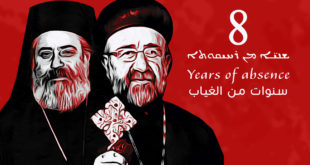PATRICK MARTIN
JERUSALEM —
Wednesday, Jun. 15, 2011
Above the tomb of Hafez al-Assad in the Syrian mountaintop village of Qardaha is a verse from the Koran: “Obey Allah. Obey the Messenger and those charged with authority among you.”
It’s an attempt by the Assad regime to give an Islamic blessing to “those charged with authority” in Syria – a minority regime, despised by the Sunni Muslim majority, that counts on support from some of Syria’s many ethnic groups to give it legitimacy. From the Druze in the south of Syria to the Christians in the west, from the Alawites in the mountains to the merchants of the big cities, it has been one of the enduring myths of the Assad regime, now headed by Bashar al-Assad, that Syria has become a melting pot of religious, ethnic and tribal groups. In this way, the propaganda says, the country is not unlike Turkey or the former Yugoslavia, where the national identity overrides all others.
But like other myths, such as the invincibility of the Assad regime, this one is coming undone as a result of the protests that have plagued the regime for the past three months.
END OF THE ASSAD MINORITY ALLIANCE
The Assads, hailing from the minority Alawi sect, offered protection to fellow minorities such as Christians and the Druze. Support us, they said, and you can practise your beliefs free of any threat in our Syria.
For years, it worked. After popular demonstrations against the regime erupted earlier this year, Ignatius IV, the Greek Orthodox Patriarch and leader of the largest Christian community in Syria, announced that his million-strong congregation whole-heartedly supported the Assad regime.
Such loyalty is based largely on the fear of what Islamic extremists might do to a Christian community that was founded by the Apostle Peter almost 2,000 years ago.
“They see what’s happening in other countries, specifically what’s happened in Egypt where we see a regime change but even more attacks against Christian churches, and they’re afraid that’s what’s going to happen in Syria,” said Jerry Dykstra, spokesman for Christian watchdog Open Doors USA.
The message is: Don’t forsake the autocrat who safeguards your community.
It is a view shared by Syria’s Druze, who have also largely supported the Assad regime, not to mention the Alawites as a whole, a people perceived as infidels and idol-worshippers by the majority of Syrians who are Sunni Muslims.
Taken together, Syria’s Alawites, Christians and Druze comprise about 25 per cent of the population. Along with Syria’s mercantile class, which includes members of various ethnic groups, they have made up the Assad alliance of faithful supporters.
A few weeks ago, Syrian Druze in the Israeli-occupied Golan Heights also spoke of their support for Mr. Assad. While they wanted to see democratic reforms, they said, and they didn’t want to see the protesters in Syria harmed, they believed that Bashar al-Assad was the best man to bring about such reforms.
This week, the view from the Druze village of Majdal Shams is decidedly different. People no longer express such confidence. While some think it treasonous to say so in public, large numbers are beginning to question if Mr. al-Assad is the man for the job.
“I hate to say that Bashar should go, because I am worried about the consequences of his departure,” said Ghandi al-Kahluni, a pharmacist. “I wish this violence would stop. I am worried for the people and for the regime. I was not worried before, but now I worry.”
Such sentiments also are being expressed by Syrian Christians. “Only the clergy continue to support him,” said one woman, a member of the Greek Orthodox Church. “Most of the members are cheering for the protesters; some of them are even demonstrating.”
Dissent is being heard among the business class as well, some of whom say they are ashamed to travel abroad because of what the world thinks of the country’s leadership. “People have lost faith in the President,” said one former business booster.
NO MORE BIG CITY SUPPORTERS?
Bashar al-Assad has always been able to count on his allies in the cities. Indeed, in the three months of Syria’s widespread uprising, the country’s two major cosmopolitan centres of Damascus and Aleppo have remained relatively quiet.
In part, that’s because the mercantile and business class found in the cities has benefited most from the substantial economic reforms Mr. al-Assad has ushered in. It is also because the cities are headquarters of the religious establishments with their don’t-rock-the-boat policies. This includes a new generation of moderate Muslim leaders encouraged by Mr. al-Assad as a counterweight to the more militant Muslim Brotherhood, many of whose leaders have been exiled, imprisoned or gone underground. All these religious bodies have something to lose if the President goes down.
But, most important, Damascus and Aleppo are where one finds the largest concentration of the government’s secret police and other security forces.
“Don’t misinterpret the quiet,” said one businessman who has been in and out of Syria a couple of times since the protests began. “This isn’t support. It’s fear.” Fear both of retribution, and chaos.
Syria’s Kurds, who account for about 10 per cent of the population and who usually are the most vocal of the government’s opponents, have been quiet as well. Perhaps they were mollified by the approval of citizenship for some 300,000 Druze that Mr. al-Assad announced in the early days of the protests.
More likely it’s because this is not their fight. Theirs is a struggle for nationhood, not a battle for reform. Better they should wait and see how they might advance their own cause from whatever comes next.
DAMASCUS MEETS BELGRADE
The members of the Assad alliance care more about having their own interests safeguarded than in the protection of the President and his immediate family. If a way could be found for Bashar al-Assad to go and a reform-minded regime to stay, they would take it.
But if the President is determined to fight to the end, it will be every group for themselves.
“If the Alawites lose the battle for the Syrian street and their control of the government, the worst will transpire for them,” said Mordechai Kedar, a professor at Bar Ilan University in Tel Aviv and a veteran of 25 years in Israel’s military intelligence. “Frenzied Sunni masses will descend on Alawi neighbourhoods in Damascus, Homs, Hama and Aleppo armed with knives, ready to detach Alawi heads from their necks.”
After that, he predicts, the country that France cobbled together almost a century ago could be blown apart much as happened to Yugoslavia.
“The Kurds in the north will declare independence as did their brethren in Iraq; the Druze in the south will restore the autonomy stolen from them by France in 1925; the Bedouins in the east will establish a state with Dir a-Zur as its capital; the Aleppans will exploit the opportunity to throw off the yoke of the hated Damascenes.”
“Thus,” concludes Mr. Kedar, “six states will rise from the ruins of Syria, each more homogeneous than the former united Syria and more legitimate in the eyes of most of its inhabitants.”
LAST GASP: NEW TACTICS
Bashar al-Assad is undoubtedly aware of all of this and may finally be shifting his tactics.
His efforts to contain the protests, and the most militarized of his responses, have increasingly been in the areas of historic Sunni agitation. From 1976 to 1982, Islamists sought to overthrow the regime of Hafez al-Assad. They were crushed in the very cities to which the current regime is turning its attention, including Jisr ash-Shughur.
But whereas the father’s regime killed tens of thousands (facilitated by a lack of modern communications that hid the events for weeks if not months), the son is taking a different approach.
His armoured divisions spent an unusually long time assembling on the outskirts of Jisr ash-Shughur after warning of extreme retribution for the killing of 120 members of the security forces the previous week. The days taken to mount the attack gave the city’s population ample time to disperse. Conveniently, the military forces were deployed to the south and east of the town, leaving the corridor to the Turkish frontier unobstructed.
Add to that the willingness of the government forces, for the first time, to allow journalists with connections to Western media to accompany the attack, and one of the first real glimpses into events in Syria in months has emerged.
It shows some evidence of a small armed opposition in the city, and a mass grave of uniformed people, although it remains unclear just which side did the killing of those buried.
All in all, it appears to have been an effort to escape some of the bad publicity the regime has encountered.
Elias Samo, a retired professor in Aleppo, hopes it’s not too late for the President to turn things around. Mr. Samo, who conducted back-channel talks with Israeli academics some 20 years ago, said the regime has used far too much of the stick against the protesters and not enough of the carrot of political reforms. “One hopes the carrot and stick configuration now will be reversed,” he said, “and the reforms will move at a faster rate.”
Rami Khouri, director of the Issam Fares Institute for Public Policy and International Affairs at the American University of Beirut, believes it is too late for the Syrian President. “He’s already gone over the edge,” he said. “I don’t see any way back.”
Not for Bashar al-Assad, but perhaps for the regime, minus its leader.
 Assyrian Democratic Organization ADO
Assyrian Democratic Organization ADO






